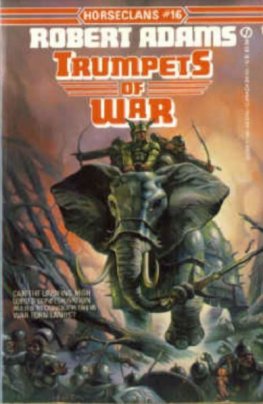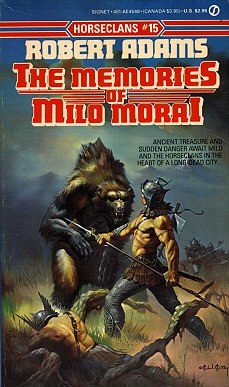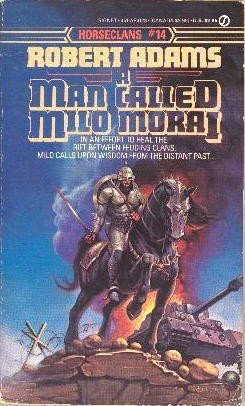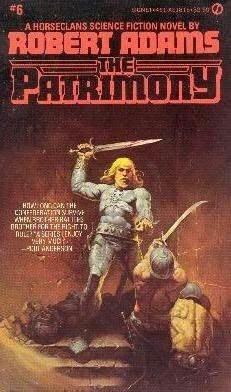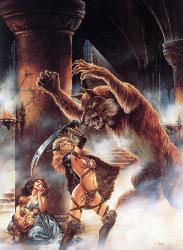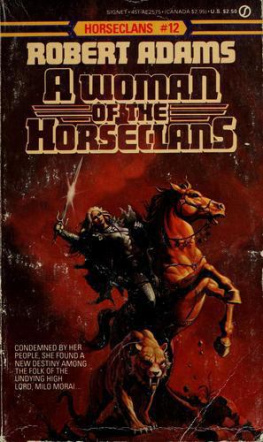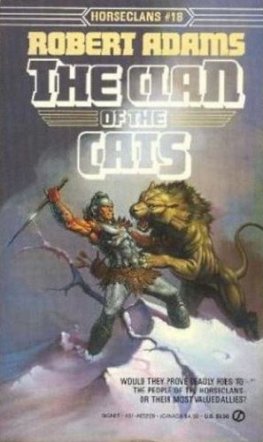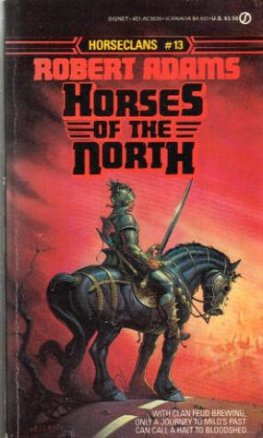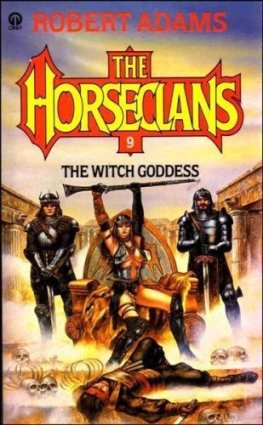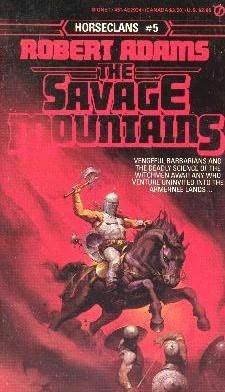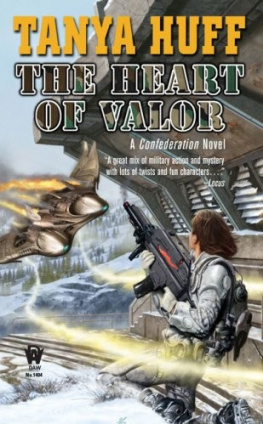Robert Adams
Trumpets of War
At the head of a force numbering five hundreds of thousands, the largest host ever seen upon this land in all memory, Zastros, High King of the Southern Ehleenoee, had invaded the Kingdom of Karaleenos, to his immediate north. But despite his vast forcepartially, actually, because of that forces very vastness and consequent difficulty to keep always under firm, central control and keep suppliedhis advance had not been either easy or inexpensive. What with green crops and forage burned where they had stood, most sources of water poisoned or foully polluted before him, while hit-and-run partisans nibbled at his flanks by both night and day, he soon was losing as many men to desertion as he was losing to enemy action or disease; furthermore, the deeper that the host penetrated into the hostile land, the larger became the percentage of loss figures, with severe malnutrition of men and beasts added into the horde of troubles, as the hyperactive partisans now closed in to his rear picked off most of the supply trains bound for the army.
Nothing that High King Zastros did or ordered done seemed to work to his advantage or that of his hosts from the moment that any of them set foot into Karaleenos. Gallopers sent back into Zastros own lands with messages had a distressing tendency to not return; so too did the various units he sent back to organize and/or guard trains of the desperately needed supplies. When message arrows loosed by unseen bowmen rained down on camps of sleeping men promising uncontested passages and guides to potable water to any man or group of men returning south, out of Karaleenos, whole units began to desert Zastros, noble officers and all. One understrength squadron of his lancers even defected, went over into the service of his waiting enemies.
Nonetheless, the host he led into camp on the southern bank of the Lumbuh River still was formidable enough to daunt many a captain. But those high-ranking heralds who crossed over the ancient stone bridgethe only way remaining to cross the swift-flowing river short of rafting, which would have been suicidal in the face of the solidly fortified north bankreturned long of face with exceedingly bad news.
It seemed that High King Zastros was facing not only King Zenos of Karaleenos and his army, but the High Lord of Kehnooryos Ehlahs, the Lord of the Pirate Isles, and several strong contingents from as many states of the barbarian Middle Kingdoms, plus thousands of mercenaries. Altogether, said the heralds, they totaled a force almost as large as that one which by now followed Zastros Green Dragon Banner, outnumbering the southerners, indeed, in horsemen.
Furthermore, their spokesmanMilos Morai, High Lord of Kehnooryos Ehlahs, King Zenos northern neighbor, with whom Zastros had been more than certain that the Kingdom of Karaleenos was at warhad flatly refused to cross the river and come to battle with the southern force. Was the High King to continue his advance, he must fling his army against the well-fortified north bank, which meant that the bridge must first be taken . . . and a thick, solid stone wall had been erected entirely across it near to the northern end of the span and topped with mechanical spearthrowers, which last meant that win, lose or draw, the Green Dragon Banner was certain to have fewer men following it after the assault than before.
That had been when High King Zastros staff had most sorely regretted having advised him to order most ail of the war-elephantswhich huge beasts it had been impossible to keep properly fed, anywaykilled and butchered to feed his starving troops while still on the march northward. Now, all that remained was a brace of elephant cows, draught beasts, which had been used to draw his monstrous wagon-mounted pavilion.
Nonetheless, the officers and specialists had hurriedly altered a couple of sets of war-elephant armor for the smallerand now very undernourishedcow elephants, given them a crash course in the bare rudiments of elephantine battle training, then used them to spearhead the advance of a picked force across the bridge, one morning.
The elephants had not liked it from the beginning. Only the repeated pricking of spearpoints from behind and the fact that with the two of them abreast the space was too narrow for either to turn about kept them going for as long as they did.
When the elephants were a little beyond the middle of the bridge, the defenders had set afire the corduroy of pine logs overlaying the stones of the roadway, and as the roaring fire neared them, the two elephants went mad. Smashing down a stretch of railstone, wood and allone of the cows had tumbled into the river. Thus granted the requisite space, the other had turned about and headed back south at a much faster pace than she had proceeded north, now heedless of just what or whom she knocked over or stepped on, her tender trunk rolled tight for protection and her eyes wide with fear and pain.
With one elephant either drowned or captured by the enemy and the other clear out of her head and last seen headed south at respectable speed, Zastros had set the artificiers of the army to fabricating a big wheeled tower a third again as high as the wall that stood on the bridge. He had kept them at it all of that day and through the night, as well. But it had never been used, for the assembled troops had not moved onto the bridge when so ordered, stubbornly just standing in their ranks, sullen-faced, pretending to not hear the orders. Not even when Zastros sent mounted troopers of his personal guard among the mutineers to maim and slay would the recalcitrants obey the commands to proceed against the enemy, though they had unhorsed and slain not a few of the Green Dragon Guards before the remainder had managed to fight their way out of the ranks.
Each succeeding hour of each succeeding day after that shameful debacle had seen calamity piled atop misfortune for High King Zastros and his miserable forces on that ill-starred venture of conquest. So repeatedly were their string of camps attacked by mounted archers, boatloads of pirates and, on one occasion, even a mob of swampers that the threatened men did the instinctive thing, moving themselves and their camps closer and ever closer together; true, this did make effective defense easier, as it shortened the perimeter, but it also made the spread of any disease or illnessand there were more than enough of each category among ill-nourished men in swampy campsfaster and more certain.
The High King, desperate for supplies now, sent off the last full-strength squadron of horsemen he owned with orders to escort back a complete train. The pitiful survivors of the last supply train to get up to the starving army reported that that squadron had not even paused at the border post, but had ridden on south.
As that word passed about the sprawling camp, the Host of the Green Dragon began to melt away like a chunk of river ice under a hot sun. In droves, the soldiers turned their faces south and quitted the camps that now were filled with starvation, disease and death. Those officers or sergeants so unwise as to try to stop the deserters were lucky to be left beaten into mere insensibility rather than dead of a swordthrust or an axe-swipe. And units ordered to pursue and kill or capture the deserters were as likely as not to, rather, join them and head for home.
Finally, the surviving peers of the Southern Kingdom met in secret council and sent a trusted man across the river in a boat by night to meet with Milos of Kehnooryos Ehlahs, King Zenos, Lord Alexandros the Pirate and the other leaders of the Northern Host and try to arrangeindeed, if necessary, beg forbearable terms for a surrender . Of course, Strahteegos Thoheeks Grahvostehee Mehseepoliskeh Eepseelospolis doubted, all things weighed and considered, that even their chosen emissary could get decent terms out of the northerners, but one could always hope . . . and pray.

